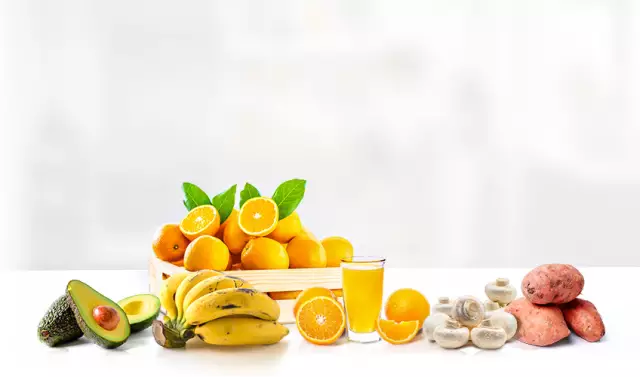- Author Rachel Wainwright wainwright@abchealthonline.com.
- Public 2023-12-15 07:39.
- Last modified 2025-11-02 20:14.
Do I need to take vitamins?
Vitamin complexes are one of the most popular drugs: probably, in our country there is no person who has not heard about the benefits of vitamins and has never taken them. The more vitamins - the better, we think, and, as it turned out, we are cruelly mistaken. Is it so necessary for the body, is the craze for multivitamin complexes harmless and is it possible to do without vitamins at all? Let's try to figure it out.

Source: depositphotos.com
Only facts
Let's look at the facts first. Vitamins are substances that the body needs in microscopic quantities in order to perform its functions. In the absence of vitamins - even when all other substances are present in the diet - the body begins to malfunction and the person becomes ill.
Normally, vitamins enter the body with food. Different foods contain different vitamins, and this is one of the reasons why the diet should be varied and include different food groups.
Vitamins are unstable and easily destroyed during heat treatment. That is why part of the diet must necessarily be represented by fresh vegetables and fruits - foods containing the highest amount of vitamins.
Is it true that the need for vitamins cannot be satisfied with food?
In the twentieth century, it was suggested that it is impossible to get the amount of vitamins required by the body only from food, so they must be additionally taken to prevent hypovitaminosis - a state of vitamin deficiency. It was believed that vitamin deficiency is a constant companion of modern man, contributing, in turn, to the weakening of immunity and the development of many diseases. This thesis was warmly supported by pharmaceutical concerns, and after a while the triumphant march of vitamin complexes began across the planet. Vitamins are prescribed for almost any disease, with the exception of hypervitaminosis (along the way it turned out: if you overdo it, this also happens). It is widely believed that vitamins always help the body (at least, they do not harm). But is it?
Decades of the vitamin boom have allowed for the accumulation of clinical experience, and now doctors are increasingly claiming that the statement about the total need for additional vitaminization is incorrect. They say that vitamin complexes in most cases are useless, and in some cases are harmful, and, as it turned out, this opinion is much more true than the fact that vitamins need to be taken almost constantly. Studies carried out by several independent centers have shown that the doses of vitamins that were considered essential for life are grossly overestimated. In fact, the vitamins supplied with food are quite enough to meet all the needs of the body - provided that the diet is diverse, contains different food groups and contains fresh vegetables and fruits. In the overwhelming majority of cases, vitamin deficiency in a modern person is not at all associated with the lack of vitamins in food, but with the problems of their assimilation in the body (for example, with a violation of the absorption process in the intestine, which occurs in many intestinal pathologies).
In the course of other studies, it was established that synthetic vitamins are absorbed by the body by no more than 5%, so there is no need to talk about their effective effect on the body.

Source: depositphotos.com
What you need to know about vitamin complexes?
- Vitamins, either individually or in combination with each other, do not protect against colds. “Drinking vitamins so as not to get sick” is not a brilliant idea. One of the proofs is the fact that the peak of the seasonal incidence of ARVI occurs in late autumn, that is, at the time when the body is most saturated with vitamins after fruit-rich summer and early autumn. If vitamins really protected against colds, no one would have heard about the autumn-winter outbreaks of respiratory diseases, their peak would be in the spring, when the vitamin content in food is minimal.
- Taking vitamin complexes is not able to protect against cancer. Moreover, it has been absolutely unequivocally established that certain vitamins (for example, vitamins A, E, C) promote the growth of malignant tumors.
- Synthetic vitamins (in other words, created in the laboratory, and not obtained from food) are highly allergenic. In particular, some pediatricians associate widespread allergy in modern babies with the fact that many women take multivitamin complexes during pregnancy.
- Vitamin-mineral complexes, which are so popular among Russians, for the most part are not a drug, but belong to the group of dietary supplements, that is, biologically active food additives. Vitamins and minerals in their composition are not in therapeutic (capable of exerting an effect) doses, but in subtherapeutic (insufficient to achieve any significant effect). In addition, antagonist ingredients are often included in them (for example, it is not recommended to simultaneously take calcium and iron, zinc and folic acid, vitamin B12 and vitamin B1, vitamin C, iron). And finally, not being drugs, these drugs do not undergo any checks, and only the manufacturer knows what exactly and in what quantity is actually in their composition.
When are vitamins needed?
However, there are situations where taking vitamins is vital. There are two such conditions: hypo- and avitaminosis, that is, a reduced amount of certain vitamins in the body and their complete absence. Usually we are talking about one or two vitamins. For example, in alcoholism, the assimilation of vitamin B1 is impaired, therefore, when treating alcoholism, it is prescribed, and in injections, and not in the form of a "vitamin", which would be meaningless.
Travelers in the old days often suffered from C-avitaminosis, colorfully described by Jack London in the story "The Mistake of God." People from poor countries, whose traditional food is refined white rice, often get sick beriberi (as they call B1-avitaminosis), and those who eat mostly corn - pellagra (this is PP-avitaminosis). Young children living in areas with low insolation, that is, with a small number of sunny days per year, have cases of vitamin D deficiency, which causes rickets.
Hypovitaminosis is diagnosed in the inhabitants of the Far North (due to the vitamin poverty of the diet), as well as in all those who eat food that contains little or no vitamins (fast food, junk food, food made in an industrial way). People who practice veganism (strict vegetarianism) often show signs of a lack of vitamin B12, which is found mainly in meat and dairy products.
In all these situations, vitamins are required. But in such cases, they perform a therapeutic function, are prescribed by a doctor in strictly calculated doses after diagnostics, and therefore we are not talking about fashionable vitamin and mineral complexes.
YouTube video related to the article:

Maria Kulkes Medical journalist About the author
Education: First Moscow State Medical University named after I. M. Sechenov, specialty "General Medicine".
Found a mistake in the text? Select it and press Ctrl + Enter.






